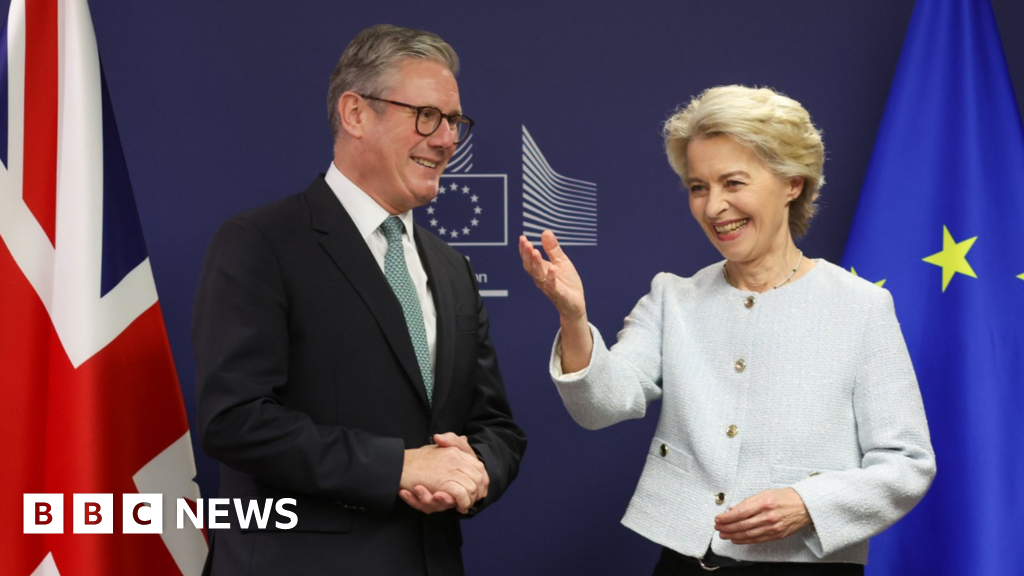Sir Keir Starmer’s First Visit to Brussels: A New Chapter in EU-UK Relations
In a significant moment for UK-EU relations, Prime Minister Sir Keir Starmer made his inaugural visit to Brussels since taking office. This visit, marked by a persistent drizzle, was not merely ceremonial; it symbolized a crucial step towards rebuilding the ties and trust that have frayed since the tumultuous Brexit negotiations. As the rain-soaked red carpet was prepared for his arrival, the atmosphere was charged with a mix of hope and caution.
A Warm Welcome Amidst Lingering Tensions
The European Parliament was adorned with both Union and EU flags, a visual representation of the desire for reconciliation. Ursula von der Leyen, the President of the European Commission, extended a warm welcome to Starmer, emphasizing the importance of this visit. However, the underlying tensions from the Brexit saga were palpable. The EU still grapples with the ramifications of losing the UK as a member, lamenting the extensive time and political capital spent on negotiations that ultimately led to a fractured relationship.
A Comprehensive Wish List
Starmer arrived in Brussels with a lengthy agenda aimed at fostering cooperation on several pressing issues. He called for enhanced collaboration on defense and security, particularly in the context of energy security and climate change. He also highlighted the need to address irregular migration, a topic that has become increasingly contentious in the wake of the Brexit vote. Starmer’s assertion that the British public yearns for "sensible leadership" regarding EU relations resonated, but the enthusiasm from his European counterparts was notably muted.
Security and Defense: A Common Ground
One of the more straightforward avenues for rapprochement lies in security and defense cooperation. The ongoing conflict in Ukraine has catalyzed a renewed sense of urgency for collaboration between the UK and the EU. Both sides have worked closely to impose sanctions on Russia and bolster Ukraine’s defenses, with the UK taking a leading role. However, a point of contention remains regarding the involvement of British businesses in the EU’s rearmament efforts, reflecting the complexities of post-Brexit relations.
Migration: A Thorny Issue
Migration emerged as another focal point of discussion. While there is a shared understanding of the need to combat people-smuggling gangs and address irregular migration, the methods for achieving these goals are fraught with disagreement. Recent calls from French and German interior ministers for a formal agreement with the UK to create more legal pathways for asylum seekers highlight the urgency of the situation. Starmer’s recent visit to Italy to explore economic agreements aimed at stemming migration at its source underscores the UK’s proactive approach, though it has drawn criticism from human rights groups concerned about potential abuses.
Trade Barriers and Economic Cooperation
Perhaps the most contentious issue on Starmer’s wish list is the desire to eliminate what he terms "unnecessary trade barriers." The EU remains skeptical, pointing out that these barriers are a direct consequence of the UK’s decision to leave the single market and customs union. Starmer reiterated that renegotiation of these terms is off the table, leaving the EU with little room to maneuver. The reality is that any trade enhancements will necessitate trade-offs, and both sides must navigate these complexities carefully.
The Youth Mobility Scheme and Cultural Exchange
In discussions about cultural exchange, the EU has proposed a youth mobility scheme that would allow young Europeans to study and work in the UK for a limited time, with reciprocal arrangements for British youth. However, Starmer’s commitment to reducing immigration levels complicates this proposal, as he has firmly stated that "free movement is a red line." This stance reflects the delicate balance he must strike between domestic political pressures and the desire for closer ties with the EU.
Looking Ahead: A Cautious Optimism
As Starmer concluded his meetings, he emphasized the importance of focusing on what can be achieved rather than dwelling on limitations. However, the European Commission has made it clear that any new agreements will hinge on the UK’s adherence to existing post-Brexit arrangements, including the Withdrawal Agreement and the Trade and Cooperation Agreement. Allegations of non-compliance have already surfaced, adding another layer of complexity to future negotiations.
Behind-the-scenes discussions are set to commence soon, with regular EU-UK summits planned for the new year. The lingering joke among Brussels journalists—that negotiations would continue indefinitely—may soon take on a new meaning as both sides grapple with the realities of their post-Brexit relationship.
Conclusion
Sir Keir Starmer’s visit to Brussels marks a pivotal moment in the ongoing saga of EU-UK relations. While the path to rebuilding trust and cooperation is fraught with challenges, the desire for a more collaborative future is evident. As both sides navigate the complexities of trade, migration, and security, the hope remains that this visit will lay the groundwork for a more constructive partnership in the years to come.
